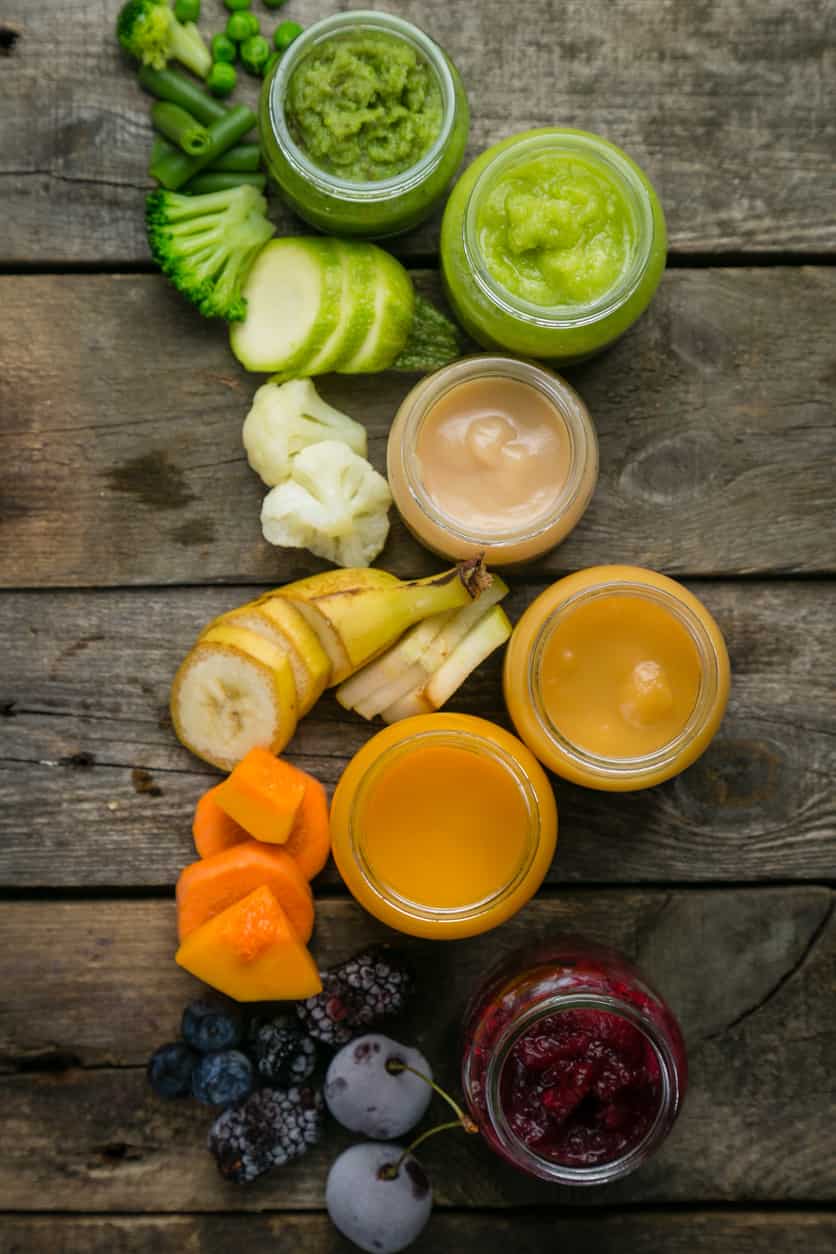Introducing solid foods to a baby is an exciting milestone that many parents look forward to! As they grow older and get ready to explore more tastes and textures, starting them off on the right foot is essential. Always have different options of liquids such as formula, breast milk, or water to avoid dryness of the food.
With so many baby food options on the market, it can be intimidating to know which foods are best for your little one. Here's what you need to know about the various types of baby foods and when (and how) to introduce them to your baby.

©iStock.com/a_namenko
Key Points of Properly Introducing Solids
- Ensure timing is right
- Practice patience
- Avoid certain foods that can cause allergies or choking
- Feed your baby nutrient-dense foods
- Keep a consistent feeding schedule
Easing Into Introducing Solid Foods
Before diving into the types of foods to implement into your child's diet, first, take a beat and understand how to implement this change. This involves introducing your baby to foods other than breast milk or formula, which can be pretty daunting. It's important not to rush into it and introduce these new foods slowly. Here are some tips on how to introduce solid foods to your baby:
- Wait until your baby is ready: You should wait until your baby is about 6 months old before introducing solids. Signs of readiness include being able to sit up with support, having lost the tongue-thrust reflex, and showing interest in your food.
- Start slowly: You should start by offering small amounts of pureed fruit or vegetables a few times a day. As your baby gets used to eating solid foods, gradually increase the quantity and variety.
- Offer finger foods: Once your baby is comfortable with pureed foods, start introducing them to small pieces of soft fruits and vegetables they can pick up with their hands. This helps them learn how to feed themselves and encourages independent eating.
- Offer a variety of food: Variety is crucial to ensure your baby gets all the necessary nutrients. This includes offering a range of fruits, vegetables, grains, protein, and dairy foods.
- Avoid adding sugar or salt: To prevent picky eating habits in the future, it’s best to avoid adding sugar or salt when introducing solids.
- Be patient: It can take some time for babies to get used to eating solids. If your baby refuses a particular food, don’t force them to eat it. Try again in a few days or weeks.

©iStock.com/NataliaDeriabina
Remember to continue breastfeeding your baby in between meals, as it helps it adjust to the new feeding schedule. Breast milk also plays the all-important role of keeping your baby healthy and nourished through it all.
What Are the Signs My Baby Is Prepared For Solids?
This is the first time your baby starts exploring tastes and textures beyond breastmilk or formula, and it can be an excellent experience for the entire family. However, before you begin adding solid foods to your baby’s diet, it’s essential to ensure they are at the right stage of development. Here are signs to help you determine whether your baby is ready for solids:

©iStock.com/petrunjela
- Baby is at least 6 months old: The American Academy of Pediatrics recommends the introduction of solid foods when babies reach 6 months old because this is when their digestive systems are mature enough to handle them.
- Baby can sit up and hold their head steady: Before introducing solids, ensure your baby can sit in an infant seat and has reasonable head control. This makes it easier for them to eat without choking.
- Baby shows interest when you eat: If your baby starts to show an interest in what you're eating and tries to reach for it, this may be a sign they are ready for solids. It’s important to remember that even if their eyes light up when you bring out the food, they still may not be old enough or ready for solid foods.
- Tongue-thrust reflex disappears: The tongue-thrust reflex is when a baby pushes food out of their mouth with their tongue. When this reflex disappears, usually around 4 to 6 months old, it's a good sign that your baby is ready for solid foods.
- Baby can pick up small objects: If your baby can pick up small objects, like a Cheerio or piece of mashed banana, and bring it to their mouth, then they may be ready for solids.
- Baby is showing signs of hunger even after the usual feedings: If your baby is still showing signs of hunger after their regular feedings, they may be ready for solid foods.
Which Foods Are The Best?
As a caring parent, you want to ensure that your child gets the proper nutrition and the perfect balance of flavors that will develop their palate in the best way possible. But with plenty of options out there, it can take a lot of work to know which foods are best for your little one!
Here's an overview of the best foods to introduce your baby to and some helpful tips and advice on creating a healthy eating plan for them.
1. Fruits
Fruit is a great way to introduce solid food into your baby’s diet. They are easy to mash or puree, and they offer a variety of flavors and nutrients that can help your baby’s development. Some of the best fruits to try include apples, pears, bananas, mangoes, papaya, watermelon, peaches, and plums. You can easily make your own purees and smoothies using these fruits.
2. Vegetables
Vegetables should also be part of your baby’s diet as they are a great source of vitamins, minerals, and fiber. Some great vegetables to try include carrots, sweet potatoes, broccoli, spinach, squash, and peas. You can mash or puree them and make various dishes, such as soups and stews. If serving them not mashed or pureed, be sure they are cut smaller to prevent possible choking.
3. Grains
Grains provide essential nutrients and fiber for your baby’s development. Some great grains include oatmeal, rice, quinoa, and barley. They can easily be made into porridge or added to soups or stews. They are also a good way to keep your child full.
4. Dairy
Dairy is integral to a healthy diet and can help your baby get the nutrition they need to grow. Try introducing small amounts of full-fat yogurt, cottage cheese, ricotta cheese, and cow’s milk. Wait until 12 months before integrating dairy into their diet. Doing so earlier could potentially result in gastrointestinal distress or other issues (via Healthline.com).
5. Legumes
Legumes are a rich source of protein, which provides your baby with the energy they need to grow. Some great legumes include lentils, beans, chickpeas, and split peas. You can make soups or purees using these ingredients. Legumes should not comprise the bulk of your baby's daily food intake, instead, they can be added as part of a healthy diet.
6. Meat, Eggs, and Fish
Meats, eggs, and fish are excellent protein sources and should be included in your baby’s diet. Try introducing small pieces of cooked chicken, eggs, beef, pork, fish, or turkey. Be sure your feeding your baby meat that is fully cooked. Additionally, try to avoid deli meats or bacon at first, as they contain preservatives and chemicals (via Healthline.com).
What Are The Solid Foods To Avoid And Why?
Knowing what foods are best avoided during this time is vital, as some can cause harm or lead to digestive issues. These are some of the foods you should avoid when introducing your baby to solids and why. Here are a few examples of these foods:
- Whole Nuts: Whole nuts, including almonds, peanuts, and cashews, should be avoided when introducing solids to your baby, as they are a choking hazard due to their size and shape. Always opt for nut butter instead, which is much smoother in texture and less likely to cause choking or blockages.
- Raw Honey: It is important to avoid raw honey when introducing solids to your baby as it can contain bacteria that can cause an illness known as infant botulism. This severe condition affects the nervous system and can be very dangerous for babies.
- Popcorn: Though a popular snack, popcorn should also be avoided because of its shape, size, and texture. It can cause choking, blockages, and even scratch your baby's throat due to its hard shell.
- Fruit Juice: Fruit juice should also be avoided when introducing solids to your baby as it is incredibly high in sugar and can lead to dental cavities and weight gain.
- Caffeinated beverages, such as coffee and tea, should also be avoided when introducing solids to your baby. Caffeine can cause insomnia, irritability, and dehydration in babies as their bodies cannot metabolize it properly.
How Do I Plan My Baby's Mealtime?
Planning a baby's mealtime when introducing solid foods can be pretty intimidating, especially for new moms. Knowing what to feed your baby and when is vital to ensure they receive adequate nutrition. We'll guide you on how to plan your baby’s mealtime when introducing solid foods. Below are 5 tips to properly schedule your baby's meals:
1. Determine when and how to begin solids: The American Academy of Pediatrics (AAP) suggests starting your baby on solid foods at about 6 months, depending on their developmental milestones. When introducing solid foods, start with a single ingredient, such as pureed fruits or vegetables, and avoid adding sugar or salt.
2. Understand your baby’s hunger cues: Pay attention to your baby’s hunger cues when planning their meals. If they seem overly interested in food and are leaning in or reaching for food when you eat, that’s a good sign they may be ready to start solid foods.
3. Create a feeding schedule: Designing a feeding schedule can help structure your baby’s meal time. Start by planning three meals daily and add snacks in between if desired. Make sure the meals are spaced out adequately to avoid overfeeding.
4. Increase variety: As your baby grows and becomes more accustomed to solid foods, start introducing them to a broader range of flavors and textures to ensure adequate nutrition. Offering different types of vegetables, fruits, proteins, grains, and dairy can help provide essential nutrients for their growth.
5. Stay consistent: If a particular food isn’t well-received, don’t give up. Be patient and offer the food again after a few days or weeks. It may take several attempts before your baby develops an appreciation for new foods.
What About Allergies?
Allergies can be a scary topic for parents with young babies, especially when introducing solids. Most of them fear that their babies could develop frightening reactions to certain foods they have never eaten before. Fortunately, there are steps you can take to help keep allergies in check while starting the solid food journey. We'll discuss what you should know about allergies when introducing your baby to solids.
- Identify food allergies early: The first step in preventing a food allergy reaction is identifying which foods may cause an allergic reaction in your baby early on. To do this, you can consult with your doctor and/or do an allergy skin test. It is essential to understand that food allergies can develop at any point in life, so monitoring your baby closely during the early months of solid foods introduction is best.
- Start with single ingredients: When introducing solids, start with single ingredients rather than multi-ingredient dishes. This helps you identify potential allergies early on, as it is easier to pinpoint a single food that causes a reaction than multiple ingredients. Additionally, starting with single ingredients allows your baby to become accustomed to the taste and texture of new foods before being exposed to more complex dishes.
- Introduce new foods slowly: As previously mentioned, it is crucial to introduce new foods slowly. Introducing just one or two fresh ingredients at a time will allow you to monitor your baby for potential reactions and adjust their diet accordingly if necessary. Additionally, feeding babies small amounts of food for several days will help them develop an affinity for the taste and texture before increasing the portion size.
- Be prepared for reactions: Even if you have taken the necessary precautions, it is still possible that your baby may have an allergic reaction to a food. The most common signs of an allergy are skin rashes, hives, eczema, wheezing, vomiting, and/or diarrhea. If these symptoms occur, it's important to remove the food from your baby's diet and consult with their doctor.

©iStock.com/monkeybusinessimages
Safety Precautions and Tips to Follow
- Fats are necessary for the development of a healthy neurological system and should be supplied till the child is 2 years old.
- Heat that is unevenly distributed should be avoided. After microwaving your baby's meal, stir it thoroughly.
- Avoid little hard food items that your baby may choke on, such as carrot rings and nuts. Watch over your baby when they are eating at all times.
- Babies require some time to learn to eat. If they initially spit the food out or are simply uninterested, don't force it. Try again in a few days.
- Commercial baby food jars have the same nutrients as fresh food and can come in handy in an emergency or while traveling. However, these items are costly and frequently contain a variety of meals blended together. It is critical that your infant learns to love the flavors and textures of different foods, and is not allergic to them.
- Avoid fruit juice due to its high sugar content. Water is the better option.

©iStock.com/monkeybusinessimages
Conclusion
Introducing solids to your baby is a significant milestone in their development. It can be stressful, but with the proper knowledge and planning, you can make this transition as smooth and enjoyable as possible.
Pay attention to your baby’s hunger cues, create a feeding schedule, introduce variety into their diet, stay consistent and identify any potential allergies early. With these steps, you can help ensure that your baby gets the nutrition they need for a healthy start in life.
The image featured at the top of this post is ©iStock.com/NataliaDeriabina.
